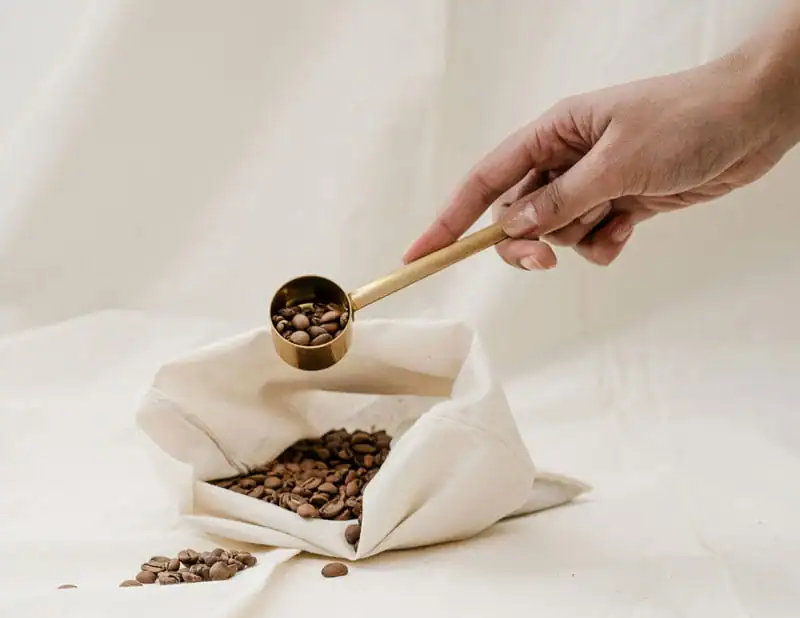Many coffee lovers have heard the claim that adding a pinch of salt to your cup of joe can help to reduce bitterness and enhance other flavors. This tip has been called the “Alton Brown trick” since he was one of the first celebrity chefs to suggest trying salt in coffee.
So that brings us to this article where I will explore the science behind this claim and help you decide if salt is the secret ingredient you’ve been missing in your coffee.
Whether you want to ween yourself off cream and sugar but find black coffee a bit too bold or you just want to see if it works, this article should have something for you. You may want to try with a small quantity. If you hate it, just dump it and brew up another…sans the salt.
Does Salt in Coffee Take the Bitterness Out?
Salt can help to reduce the bitterness in coffee by blocking the receptors on the tongue that detect bitter flavors. This can be a useful trick for those who find coffee too bitter to drink on its own.
However, you should realize that adding salt to coffee can alter the overall flavor profile and not be appreciated by some. Most importantly…too much salt may make the beverage unpalatable.
Before you decide to add salt to your coffee, consider trying other methods that may help reduce the bitterness. Use a higher-grade bean, tweak the brewing temperature or use a blend with lower acidity … it might just be what is required for obtaining an ideal flavor that satisfies your taste buds. See below for more ideas about improving your coffee drinking experience!
How Much Salt Should I Add To My Coffee To Reduce Bitterness?
Generally, just a pinch of salt can be added to a cup of coffee and then adjusted as needed. It is important to start with a small amount and gradually add more until the desired level of bitterness reduction is achieved.
Most people find it easier to just add a pinch of salt in coffee grounds before brewing. Doing this will help more evenly distribute the salt through the brewing process.
For the most optimal-tasting coffee, it is recommended to use high-quality sea salt rather than table salt. However, keep in mind that using any type of sodium based salt will adjust the flavor profile of your brew to taste less bitter.

The amount of salt I use in coffee is the same amount that I use to counteract bitterness in a glass of red wine. To learn more about why salt also works with wine, see Just a Pinch – Why Does Salt Make Wine Taste Better?
Is There a Difference In Taste Between Using Table Salt or Sea Salt in Coffee?
Common Table salt is heavily processed and can contain anti-caking agents and other additives such as Iodine that can affect the taste of coffee. Sea salt and kosher salt, on the other hand, tend to be minimally processed and have a more natural taste making them the preferred option for most people. To learn more about Sea Salt, check out the article on Sea Salt & Sea Salt Flakes.
However, the difference in taste between table salt and sea salt may be subtle and not noticeable for some people. The quantity that you want to add is very small, so the flavor profile of the salt may not be noticeable.
My preferred salt to use is Maldon salt. In addition to being a sea salt with no additives, the big crystals and non-dense structure allows me to pinch out a very small amount of salt at a time.
This is a 240 gram (about 8.5 ounce) package of Maldon salt. It comes in the traditional (and recyclable!) green box.
Are There Any Negative Effects Of Adding Salt To Coffee?
While adding a small amount of salt to coffee can help to reduce bitterness, it is important to be aware of any potential negative effects. One potential negative effect is that it can change the overall flavor profile of the coffee. Another potential issue could be the addition of unneeded salt to your diet – but the amount needed is very small.
Salt is an essential mineral for our bodies, yet consuming too much can be perilous. High blood pressure, heart disease, and other health issues arise from the over-consumption of salt. To ensure your well being it’s important to use this seasoning in moderation, as well as monitor overall intake throughout the day.
Will my coffee taste salty?
Nope! The amount of salt needed to reduce bitter flavor is a very small quantity. You’ll notice that the flavor profile changes, but you will not taste any salty flavor as long as you use an amount similar to what is shown in the picture above.
What Is The Difference Between Salt and Sugar In Terms Of Reducing Coffee Bitterness?
Salt and sugar are both common ingredients that can reduce bitterness in coffee, but they work in different ways and have different effects on the overall flavor profile of the coffee.
Salt
Salt works by blocking the receptors on the tongue that detect bitterness, thus reducing the perception of bitterness. Salt also enhances other flavors, such as sweetness and savoriness. Salt should be added in very small amounts, as it can make the coffee unpalatable if too much is used.
Sugar
Sugar, on the other hand, works by masking the bitter compounds in coffee. It can also add a sweet taste to the coffee, but it does not enhance other flavors as salt does. Additionally, it will add calories to your drink.
When it comes to reducing bitterness in coffee, salt and sugar both have their benefits. Salt is a more discreet option for decreasing the bitter taste of coffee without affecting its natural flavor profile too much, yet sugar can add sweetness to your brew if that’s something you prefer. It all depends on individual preference.
Do Professional Baristas Add Salt To Coffee?
Professional baristas are unlikely to use this method. Coffee shops have access to better beans, better preparation methods and are probably trying to also sell bulk beans. Modifying the flavor profile with salt is bad business.
It is worth noting that adding salt to coffee is not a new practice. Historically, in some regions, like Ethiopia, Yemen, and other parts of Africa, salt was added to coffee as a traditional practice.
Does Adding Salt To Coffee Affect the Caffeine Level?
Adding salt in coffee does not affect the caffeine level. Caffeine is a naturally occurring stimulant found in coffee beans, and it is not affected by the addition of salt. Instead, the type of coffee bean, the brewing method, and the serving size, are factors that can affect the caffeine level.
What Are Some Ways To Reduce The Bitterness In Coffee?
There are several ways to reduce the bitterness in coffee, some of which include:
- Using High-Quality Beans – Using freshly roasted, high-quality beans can make a big difference in the taste of coffee. Beans that are over-roasted or stale can contribute to bitterness.
- Adjusting Brewing Temperature – Water that is too hot can extract too many of the bitter compounds from the coffee beans, resulting in a bitter taste. Therefore, it’s important to brew coffee at the appropriate temperature.
- Using the Right Grind – Using the right grind for your brewing method can also help to reduce bitterness. A fine grind can extract more of the bitter compounds than a coarse grind.
- Experimenting with Different Brewing Methods – Different brewing methods can also affect the taste of coffee. Some methods, such as Espresso, Pour-over or French press, can produce a smoother, less bitter cup of coffee. These methods also tend to reduce the amount of acid in the coffee, which can also improve palatability and digestibility of the coffee.
- Adding a Small Amount of Sugar – Adding a pinch of sugar can drastically reduce any bitterness, making your dish as sweet and flavourful as you’d like it to be.
- Adding Cream or Milk – A splash of cream or milk can help to reduce the bitterness of coffee and make it even more smooth and enjoyable.
- Using a Coffee Blend – Using a blend of different types of beans can help to balance out the flavors and reduce bitterness.

Upgrading your coffee brewing method can reduce the bitterness (and acidity) of the resulting coffee. Here is a pour-over in process. I think I can almost smell it …
What Are Some Other Common Ways To Enhance The Flavor Of Coffee?
A lot of the same ways employed to reduce the bitterness can also apply to change the flavor profile of your cup of joe. In addition to any methods mentioned above, here are a few more specifically geared to improving the flavor profile:
- Grinding the Beans Just Before Brewing – Freshly ground beans have a stronger aroma and flavor than pre-ground beans.
- Grinding the Beans Uniformly – A burr grinder that has the amount of grind calibrated for your brewing method and taste will give you a better result than a pulse grinder that creates a variety of coffee ground diameters (chunky to dusty).
- Using the Right Amount of Coffee – Using the correct amount of coffee for the amount of water can help to ensure that the flavor is balanced.
- Storing Coffee Beans Properly – Proper storage of coffee beans can help to preserve the flavor. Beans should be stored in an airtight container and kept away from light, heat, and moisture.
- Adding Flavorings – Some people like to add flavorings such as cinnamon, vanilla, or chocolate to their coffee to enhance the taste.
- Using Quality Water – Water makes up the bulk of your coffee drink, so you might as well use the best. Try filtered or bottled water the next time you brew up those expensive, freshly ground coffee beans. My preference is to always use water from my Reverse Osmosis filter. This has the added benefit of not having to de-scale the espresso machine quite so often.
Featured & Pour-over Photos by cottonbro studio.








